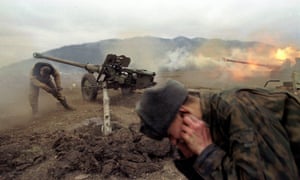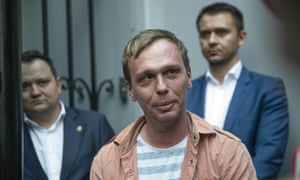Natalie Nougayrède
 Vladimir Putin is on a high. Kicked out of the G8 in 2014 after the start of his military operations in Ukraine, he’s been making full use of the G20 summit in Osaka to bask in meetings with world grandees and soak up all the international media attention he possibly can, complete with a not very challenging interview with the Financial Times.
Vladimir Putin is on a high. Kicked out of the G8 in 2014 after the start of his military operations in Ukraine, he’s been making full use of the G20 summit in Osaka to bask in meetings with world grandees and soak up all the international media attention he possibly can, complete with a not very challenging interview with the Financial Times.
Ever the opportunist, he takes what’s on offer, he glides, he smirks. And he watches with glee as we huff and puff at his provocations, whose over-riding purpose is to keep us on edge and play on our divisions.
This is now international showtime for Putin. After all, few people outside Russia paid much attention to his four-hour annual Direct Line TV show last week. I did watch part of it though, and what struck me was that Putin is getting older, and that he’s deploying particularly intensive PR work to try to neutralise a flurry of domestic tensions.
Russian friends tell me the country “feels like 2010, when things were starting to bubble up”, ahead of the street protests that broke out during the following two years. Russia’s economy isn’t doing brilliantly. Putin’s decision to have the investigative journalist Ivan Golunov released and the handing over of the initiative to local protesters in Ekaterinburg in a recent dispute over the building of a cathedral were unexpected developments. OK, this wasn’t the end of political repression, but these were gestures that seemed an attempt to signal a softer touch – if only for now.
As Fiona Hill, one of the best Russia analysts around and now a departing Trump adviser, wrote in her 2012 book, Mr Putin, Operative in the Kremlin: “Uncovering the ‘real Putins’ requires looking beyond the staged performances and the deliberately assumed guises that constitute the Putin political brand.” File the comment to the FT about liberalism being “obsolete” in that category. A few years ago, take note, he was saying the exact opposite, telling us: “I’m a liberal.” Words tossed out like this have little meaning. They’re like small grenades or stink bombs aimed at deepening our self-doubt, despondency and fractiousness.
To fathom this, read Peter Pomerantsev’s book, Nothing is True and Everything is Possible, a memoir from inside Russia’s state propaganda machine. Putin will love western far-left and far-right criticisms of “liberalism”, just as he enjoys whatever anger can be fired up among eastern European politicians who are understandably worried about his next territorial encroachment. To his domestic audience it’s all perfect proof that Russia is back, and its leader is a slick mastermind. Putin is so good at exploiting our obsessions and weak spots: it’s a tactic he’s long perfected to deflect attention from his own record.
 FacebookTwitterPinterest Russian investigative journalist Ivan Golunov, centre, was unexpectedly released from custody in June. Photograph: Pavel Golovkin/AP
FacebookTwitterPinterest Russian investigative journalist Ivan Golunov, centre, was unexpectedly released from custody in June. Photograph: Pavel Golovkin/AP
Clear the fog a bit, and what is there, really? Russia’s sense of its impunity – I mean big time, murderous, war criminal-style impunity. Think about this: at the end of this year, Russia – whether in its Soviet or post-Soviet incarnations – will have been at war almost continuously for four decades. From the one million civilians killed in the Soviet war in Afghanistan (1979-89) to the hundreds of thousands of Syrians who’ve perished at the receiving end of Russia’s and Assad’s war machine, the chain of impunity is long. See the list of Russian wars: Transnistria (1992), Abkhazia (1992-93), Chechnya (1994-1996 and 1999-2009), Georgia (2008), Ukraine (since 2014), Syria (since 2015). Putin first came to power on the back of a war – in Chechnya – whose atrocities I saw firsthand as a reporter. There is a continuum between the deliberate targeting of hospitals, schools and populated areas by Russian aircraft in Syria and what happened in Chechnya. You cannot understand Putin’s regime, the man himself, his worldview, nor how he’s shaped Russian society, without having those connections in mind.
Just last week the Dutch-led investigation into the 2014 downing of flight MH17 brought an interesting detail to the fore: one of the Russian men charged, Igor Girkin, a former military intelligence officer, had been personally involved in several of the wars listed above. In Chechnya, Girkin took part in mass atrocities, according to the Russian human rights organisation, Memorial.
We tend to look at contemporary Russia in a piecemeal way: one crisis after the other, as if these weren’t linked. Yet they are. For too long we in the west turned a blind eye, or thought some of these wars would remain local issues. We didn’t realise they would come to define Russia’s power structure and how it relates to the outside world. War crimes have gone unpunished for decades, because no one cared internationally or no one was able to do anything, and because Russia has no independent judiciary to speak of.
Of course, Russia isn’t the only country to have waged a long string of wars. Nor the only one to seek to cover up the crimes its forces, militias and hired guns perpetrate. But there are no Chilcot-style inquiries in Russia, no possibility to hold power to account, nor (to date) any whistleblowers exposing misdeeds.
War has been the backdrop to the crushing of political opposition in Russia, to the militarisation of society, to the creation of a personality cult and the thick blanket of propaganda. We cringe when Putin comes up with a crunchy soundbite about “liberalism”, but where are the questions that need to be put directly to him about repeated, deliberate war crimes against civilians, and his responsibility for them?
No comments:
Post a Comment